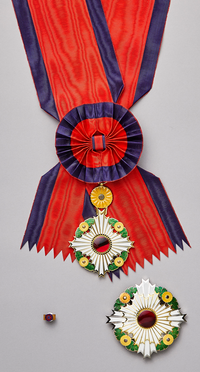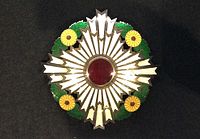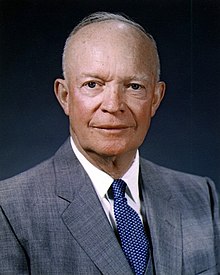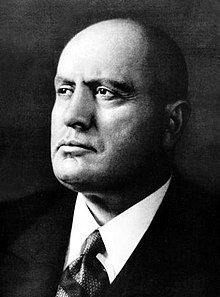The Supreme Order of the Chrysanthemum (大勲位菊花章, Dai-kun'i kikka-shō) is Japan's highest order. The Grand Cordon of the Order was established in 1876 by Emperor Meiji of Japan; the Collar of the Order was added on 4 January 1888. Unlike its European counterparts, the order may be conferred posthumously.
| Supreme Order of the Chrysanthemum 大勲位菊花章 Dai-kun'i kikka-shō | |
|---|---|
 Grand Cordon of the Supreme Order of the Chrysanthemum | |
| Awarded by the Emperor of Japan | |
| Country | |
| Awarded for | Exceptionally meritorious achievement/service |
| Status | Currently constituted |
| Founder | 27 December 1876 |
| Sovereign | HM The Emperor |
| Grades | Collar Grand Cordon |
| Precedence | |
| Next (higher) | None (highest) |
| Next (lower) | Order of the Paulownia Flowers |
Ribbon of the Order | |
Apart from the Imperial Family, only seven Japanese citizens have ever been decorated with the collar in their lifetimes; the last such award was to former Prime Minister Saionji Kinmochi in 1928. Eight others have been posthumously decorated with the collar; the last such award was to former Prime Minister Shinzo Abe in 2022.[1] Today, only the reigning Emperor holds this dignity as sovereign of the order; however, exceptions are made for foreign heads of state, who can be awarded the collar in friendship.
The grand cordon is the highest possible honour a Japanese citizen can be awarded during his or her lifetime. Aside from members of the Imperial Family, 53 Japanese citizens have been decorated with the grand cordon; of these, only 23 were living at the time of receipt.
Insignia
editThe collar of the order is made of gold, and features the kanji for "Meiji", in classic form, indicating the era of the order's establishment. It is decorated with gold chrysanthemum blossoms and green-enamelled leaves.
The sash of the grand cordon of the order is red with dark blue border stripes. It is worn on the right shoulder.
The star of the order is similar to the badge, but in silver, without the chrysanthemum suspension, and with an eight-pointed gilt medallion (with white-enamelled rays and red-enamelled sun disc) placed at the centre. It is worn on the left chest.
The badge of the order is a four-pointed gilt badge with white-enamelled rays; the centre bears a red enamelled sun disc. On each of the four corners of the badge is a yellow-enamelled chrysanthemum blossom with green-enamelled chrysanthemum leaves. The badge is suspended on a yellow-enamelled chrysanthemum, either on the collar or on the grand cordon.
| Ribbon bars | |
|---|---|
 Collar |  Grand Cordon |
Grades
edit| Name and image | Enactment date | Purpose of the award |
|---|---|---|
| 大勲位菊花章頸飾 Collar of the Supreme Order of the Chrysanthemum  | 4 January 1888 | It is said to be "a special gift for those decorated with the Supreme Order."[2][a] |
| 大勲位菊花大綬章 Grand Cordon of the Supreme Order of the Chrysanthemum  badge (top), star (bottom right), rosette (bottom left) | 27 December 1876 | "Specially awarded... to those who have excellent merit, above the merit for which the Grand Cordon of the Order of the Rising Sun or the Grand Cordon of the Order of the Sacred Treasures would be awarded".[3] |
| 大勲位菊花章 Supreme Order of the Chrysanthemum  | 27 December 1876 | It has never been awarded on its own, instead it has been treated as the star of the Grand Cordon and of the Collar; officially incorporated as the star of both grades in the 2003 institutional reform. |
Sovereigns
edit- Emperor Meiji (Sovereign from 27 December 1876)
- Emperor Taishō (Grand Cordon 3 November 1889; Collar 10 May 1900; Sovereign from 30 July 1912)
- Emperor Shōwa (Grand Cordon 9 September 1912; Collar as Regent 24 September 1921; Sovereign from 25 December 1926)
- Emperor Akihito (Grand Cordon 10 November 1952; Sovereign from 7 January 1989 to 30 April 2019)
- Emperor Naruhito (Grand Cordon 23 February 1980; Sovereign since 1 May 2019)
Awards of the Collar of the Order of the Chrysanthemum to members of the Imperial Family and royalty
editAwards made to imperial princes while living
edit- Prince Komatsu Akihito (5 August 1895)
- Prince Fushimi Sadanaru (19 January 1916)
- Prince Kan'in Kotohito (24 September 1921)
- Prince Fushimi Hiroyasu (29 April 1934)
- Prince Nashimoto Morimasa (29 April 1940)
Posthumous awards to imperial princes
edit- Prince Arisugawa Taruhito (16 January 1895)
- Prince Kitashirakawa Yoshihisa (1 November 1895)
- Prince Arisugawa Takehito (7 July 1913)
- Prince Higashifushimi Yorihito (27 June 1922)
- Prince Kuniyoshi Kuni (27 January 1929)
Posthumous award to foreign royalty
edit- Gojong of the Korean Empire (21 January 1919)
Awards of the Grand Cordon of the Order of the Chrysanthemum to members of the Imperial Family and royalty
editAwards made to imperial princes while living
edit- Prince Arisugawa Taruhito (2 November 1877)
- Prince Komatsu Akihito (7 December 1882)
- Prince Arisugawa Takahito (24 January 1886)
- Prince Kitashirakawa Yoshihisa (29 December 1886)
- Prince Arisugawa Takehito (29 December 1886)
- Prince Kuni Asahiko (29 December 1886)
- Prince Fushimi Sadanaru (29 December 1886)
- Prince Yamashina Akira (29 December 1886)
- Prince Kan'in Kotohito (18 August 1887)
- Prince Higashifushimi Yorihito (15 July 1889)
- Prince Kaya Kuninori (3 November 1903)
- Prince Kuni Kuniyoshi (3 November 1903)
- Prince Yamashina Kikumaro (3 November 1903)
- Prince Nashimoto Morimasa (3 November 1904)
- Prince Fushimi Hiroyasu (3 November 1905)
- Prince Arisugawa Tanehito (4 April 1908)
- Prince Takeda Tsunehisa (31 October 1913)
- Prince Asaka Yasuhiko (31 October 1917)
- Prince Kuni Taka (31 October 1917)
- Prince Kitashirakawa Naruhisa (31 October 1917)
- Prince Higashikuni Naruhiko (31 October 1917)
- Prince Chichibu (25 October 1922)
- Prince Kachō Hirotada (19 March 1924)
- Prince Takamatsu (1 February 1925)
- Prince Fushimi Hiroyoshi (3 November 1928)
- Prince Kaya Tsunenori (7 December 1930)
- Prince Kuni Asaakira (25 May 1932)
- Prince Kan'in Haruhito (3 November 1934)
- Prince Mikasa (1 October 1936)
- Prince Takeda Tsuneyoshi (3 November 1940)
- Prince Asaka Takahiko (7 November 1940)
- Prince Hitachi (28 November 1955)
- Prince Tomohito of Mikasa (5 January 1966)
- Prince Katsura (27 February 1968)
- Prince Takamado (29 December 1974)
- Crown Prince Naruhito (23 February 1980)
- Prince Akishino (30 November 1985)
Posthumous awards to imperial princes
edit- Prince Kitashirakawa Nagahisa (4 September 1940)
Awards to foreign royalty
edit- King Alfonso XIII (7 July 1897)
- Prince Yi Un of Korea (27 April 1920)
- Prince Yi Kang of Korea (8 January 1924)
- Prince Yi Geon of Korea (3 November 1926)
- Prince Yi Wu of Korea (7 November 1943)
- King Charles III of the United Kingdom (5 October 1971)
- Sultan Haji Hassanal Bolkiah Mu'izzaddin Waddaulah of Brunei (April 1984)
- King Birendra of Nepal (1975)
- King Juan Carlos I (1980)
- Crown Prince Dipendra of Nepal (12 April 2001)
- King Felipe VI (5 April 2017)
Ordinary awards of the Collar of the Order of the Chrysanthemum
edit
Awards made to living individuals
edit- Itō Hirobumi (1 April 1906)
- Ōyama Iwao (1 April 1906)
- Yamagata Aritomo (1 April 1906)
- Katsura Tarō (10 October 1913)
- Matsukata Masayoshi (14 July 1916)
- Tōgō Heihachirō (11 November 1926)
- Saionji Kinmochi (10 November 1928)
Posthumous awards
edit- Inoue Kaoru (1 September 1915)
- Tokudaiji Sanetsune (4 June 1919)
- Ōkuma Shigenobu (10 January 1922)
- Yamamoto Gonbee (9 December 1933)
- Shigeru Yoshida (20 October 1967)
- Eisaku Satō (3 June 1975)
- Yasuhiro Nakasone (29 November 2019)
- Shinzō Abe (11 July 2022)*
- * : Awarded with the Grand Cordon[4]
Ordinary awards of the Grand Cordon of the Order of the Chrysanthemum
editAwards made to living recipients
edit
- Sanjō Sanetomi (11 April 1882)
- Iwakura Tomomi (1 November 1882)
- Shimazu Hisamitsu (5 November 1887)
- Nakayama Tadayasu (14 May 1888)
- Itō Hirobumi (5 August 1895)*
- Kujō Michitaka (10 May 1900)
- Ōyama Iwao (3 June 1902)*
- Saigō Tsugumichi (3 June 1902)
- Yamagata Aritomo (3 June 1902)*
- Inoue Kaoru (1 April 1906)⁑
- Katsura Tarō (1 April 1906)⁑
- Tōgō Heihachirō (1 April 1906)*
- Tokudaiji Sanetsune (1 April 1906)⁑
- Matsukata Masayoshi (1 April 1906)*
- Nozu Michitsura (6 October 1908)
- Itō Sukeyuki (10 November 1913)
- Ōkuma Shigenobu (14 July 1916)⁑
- Saionji Kinmochi (21 December 1918)*
- Ye Wanyong, (February 1926)[5]
- Oku Yasukata (10 November 1928)
- Yamamoto Gonbee (10 November 1928)⁑
- Shigeru Yoshida (29 April 1964)⁑
- Eisaku Satō (3 November 1972)⁑
- Yasuhiro Nakasone (29 April 1997)⁑
- * : Later awarded the Collar
- ⁑ : Posthumously awarded the Collar
Posthumous awards
edit
- Kuroda Kiyotaka (25 August 1900)
- Terauchi Masatake (3 November 1919)
- Hara Takashi (4 November 1921)
- Kabayama Sukenori (8 February 1922)
- Katō Tomosaburō (24 August 1923)
- Hasegawa Yoshimichi (28 January 1924)
- Katō Takaaki (28 January 1926)
- Kawamura Kageaki (28 April 1926)
- Inoue Yoshika (22 March 1929)
- Uehara Yūsaku (8 November 1933)
- Saitō Makoto (26 February 1936)
- Takahashi Korekiyo (26 February 1936)
- Tokugawa Iesato (5 June 1940)
- Kaneko Kentarō (16 May 1942)
- Kiyoura Keigo (5 November 1942)
- Isoroku Yamamoto (18 April 1943)
- Ichiki Kitokurō (17 December 1944)
- Ichirō Hatoyama (7 March 1959)
- Hayato Ikeda (13 August 1965)
- Kōtarō Tanaka (1 March 1974)
- Masayoshi Ōhira (12 June 1980)
- Nobusuke Kishi (7 August 1987)
- Takeo Miki (14 November 1988)
- Takeo Fukuda (5 July 1995)
- Keizō Obuchi (14 May 2000)
- Noboru Takeshita (19 June 2000)
- Zenkō Suzuki (19 July 2004)
- Ryūtarō Hashimoto (1 July 2006)
- Toshiki Kaifu (9 January 2022)
- Shinzō Abe (11 July 2022)*
- * : Awarded with the Collar[4]
Foreign recipients of the Order of the Chrysanthemum
editThis section needs additional citations for verification. (August 2023) |
Collar
edit- Henri, Grand Duke of Luxembourg, 2017[citation needed]
- Sabah Al-Ahmad Al-Jaber Al-Sabah, Emir of Kuwait,2017[citation needed]
- Willem-Alexander, King of the Netherlands, 2014[6]
- Margrethe II, Queen of Denmark[citation needed]
- Harald V, King of Norway[citation needed]
- Carl XVI Gustav, King of Sweden[citation needed]
- Albert II, King of the Belgians, 1996[citation needed]
- Philippe, King of the Belgians, 2016[citation needed]
- Mohammed VI, King of Morocco, 2005[b][citation needed]
- Abdullah II, King of Jordan, 1999[citation needed]
- Tuanku Syed Sirajuddin, King of Malaysia, 2005[citation needed]
- Hassanal Bolkiah, Sultan of Brunei, 1984[citation needed]
- Jigme Singye Wangchuck, King of Bhutan, 1987[citation needed]
- Juan Carlos I, King of Spain, 1980[citation needed]
- Felipe VI, King of Spain, 2017[citation needed]
- Salman bin Abdulaziz Al Saud, King of Saudi Arabia, 2017[7]
- Tarja Halonen, President of Finland[citation needed]
Grand Cordon
edit- Charles III, King of the United Kingdom[8]
- Victoria, Crown Princess of Sweden
- Prince Carl Philip[9]
- Frederik X, King of Denmark[10]
- Prince Joachim of Denmark[11]
- Vajiralongkorn, King of Thailand
- Willem-Alexander, King of the Netherlands
- Norodom Sihamoni, King of Cambodia, 2010[12]
- Philippe, King of the Belgians[13]
- François Hollande, President of France[14]
- Toomas Hendrik Ilves, President of Estonia[citation needed]
- Valdas Adamkus, President of Lithuania[15]
- Aleksander Kwaśniewski, President of Poland[16]
- Vaira Vīķe-Freiberga, President of Latvia[citation needed]
- Gloria Macapagal Arroyo, President of the Philippines[citation needed]
- Nursultan Nazarbayev, President of Kazakhstan[17]
- Mauricio Macri, President of Argentina[18]
- Fernando Henrique Cardoso, President of Brazil[citation needed]
- Haakon, Crown Prince of Norway[citation needed]
- Beatrix of the Netherlands[citation needed]
Collar (deceased)
edit

- Edward VII, King of the United Kingdom and Emperor of India (1841–1910)[19]
- George V, King of the United Kingdom and Emperor of India (1865–1936)[citation needed]
- Wilhelm II, Emperor of Germany (1859–1941)[citation needed]
- Franz Joseph I, Emperor of Austria-Hungary (1830–1916)[citation needed]
- Victor Emmanuel III, King of Italy (1869–1947)[citation needed]
- Leopold II, King of Belgium (1835–1909)[citation needed]
- Emperor Gojong of Korea (1852–1919)[citation needed]
- Emperor Sunjong of Korea (1874–1926)[citation needed]
- Tuanku Syed Putra, King of Malaysia (1920–2000)[citation needed]
- Haile Selassie I, Emperor of Ethiopia (1892–1974)[citation needed]
- Sultan Ismail Nasiruddin Shah, King of Malaysia (1906–1979)[citation needed]
- Sultan Abdul Halim, King of Malaysia (1970–2017)[citation needed]
- Alfonso XIII, King of Spain (1886–1941)[20]
- Dwight D. Eisenhower, President of the United States (1890–1969)[citation needed]
- Ernesto Geisel, President of Brazil (1907–1996)[citation needed]
- Sultan Azlan Shah, Yang di-Pertuan Agong (king) of Malaysia (1928–2014)[citation needed]
- Birendra, King of Nepal (1945–2001)[citation needed]
- Mahendra, King of Nepal (1920–1972)[citation needed]
- George Tupou V, King of Tonga[citation needed] (1948–2012)[citation needed]
- Suharto, President of Indonesia (1921–2008)[citation needed]
- Muhammad Zahir Shah, King of Afghanistan (1914–2007)[c][citation needed]
- Fuad I, King of Egypt and the Sudan (1868–1936)[citation needed]
- Faruk I, King of Egypt and the Sudan (1920–1965)[citation needed]
- Hussein I, King of Jordan (1935–1999)[citation needed]
- Norodom Sihanouk, King of Cambodia (1922–2012) 1968[d][citation needed]
- Jaber Al-Ahmad Al-Jaber Al-Sabah, Emir of Kuwait (1926–2006)[citation needed]
- Muhammad Reza Pahlavi, Shah (Emperor) of Iran (1919–1980)[citation needed]
- Abdul Hamid II, Sultan of the Ottoman Empire, 1887 (1842–1912)[21]
- Bhumibol Adulyadej, King of Thailand (1946–2016)[citation needed]
- Khalifa bin Hamad Al Thani, Emir of Qatar, 1984 (1932–2016)[citation needed]
- Sabah Al-Ahmad Al-Jaber Al-Sabah, Emir of Kuwait, 2012 (1929–2020)[citation needed]
- Elizabeth II, Queen of the United Kingdom, 1962 (1926–2022)[22]
- Christian X of Denmark, (1870–1947)[citation needed]
- Frederik IX of Denmark, (1899–1972)[citation needed]
- Haakon VII of Norway, (1872–1957)[citation needed]
- Olav V of Norway, (1903–1991)[citation needed]
- Tāufaʻāhau Tupou IV of Tonga, (1918–2006)[citation needed]
- Gustaf VI Adolf of Sweden, (1882–1973)[citation needed]
- Nicholas II of Russia, (1868–1918)[citation needed]
Grand Cordon (deceased)
edit
- Abdul Hamid II, Sultan of the Ottoman Empire (1842–1918)[e]
- Archduke Franz Ferdinand of Austria, Crown Prince of the Austro Hungarian Empire (1863–1914)
- Luitpold, Prince Regent of Bavaria (1821–1912)
- Prince Arthur of Connaught (1883–1938)[24]
- Guangxu Emperor of Qing dynasty China (1871–1908)
- Wang Jingwei, President of the Wang Jingwei regime, December 1942
- Aishwarya, Queen consort of Nepal (1949–2001)
- Dipendra, Crown Prince of Nepal (1971–2001)
- Prince Henry, Duke of Gloucester (1900–1974)[25]
- Sukarno, President of Indonesia (1901–1970)
- Soeharto, President of Indonesia (1921–2008)
- Sadi Carnot, President of France (1837–1894)
- Benito Mussolini, Prime Minister of Italy (1883–1945)[26]
- Porfirio Díaz, President of Mexico (1830–1915)
- Álvaro Obregón, President of Mexico (1880–1928)[27]
- Prajadhipok, King of Siam (1893–1941)[28]
- Puyi, Emperor of Manchukuo (1906–1967)
- Ronald Reagan, President of the United States (1911–2004)[29]
- Samuel Robinson (1870–1958)[30]
- Juscelino Kubitschek, President of Brazil (1902–1976)
- Ferdinand Marcos, President of the Philippines (1917–1989)[31] Honor awarded 1966 --]
- Amha Selassie I, Emperor of Ethiopia (1916–1997)[citation needed]
- Prince Imperial Makonnen of Ethiopia (1923–1957)[citation needed]
- Prince Imperial Sahle Selassie of Ethiopia (1931–1962)[citation needed]
- Norodom Suramarit, King of Cambodia (1896–1960)[citation needed]
- Josip Broz Tito, President of Yugoslavia, 1968[32]
- Prince Imperial Uihwa of Korea (1877–1955)[citation needed]
- Crown Prince Vong Savang of Laos (1931–1978?)[citation needed]
- Crown Prince Euimin of Korea (1897–1970)[citation needed]
- Todor Zhivkov of the People's Republic of Bulgaria (1911–1998)[citation needed]
- David Kalākaua, King of Hawaii (1836–1891)[33]
- Chulalongkorn, King of Siam (1853–1910)[34]
- Qaboos, Sultan of Oman (1940–2020)
- Hosni Mubarak, President of Egypt (1928–2020)
- Prince Philip, Duke of Edinburgh, Prince consort of the United Kingdom (1921–2021)
- Benigno Aquino III, President of the Philippines (1960–2021)[35]
- Elizabeth II, Queen of the United Kingdom, 1962 (1926–2022)[22]
- Alexander II of Russia (1818–1881)
- Alexander III of Russia (1845–1894)[36]
- Nicholas II of Russia (1868–1918)[citation needed]
- Grand Duke Vladimir Alexandrovich of Russia (1847–1909)[citation needed]
- Grand Duke Alexei Alexandrovich of Russia (1850–1908)[citation needed]
- Grand Duke Sergei Alexandrovich of Russia (1857–1905)[citation needed]
- Grand Duke Konstantin Konstantinovich of Russia (1858–1915)[citation needed]
- Grand Duke George Alexandrovich of Russia (1871–1899)[citation needed]
- Grand Duke Kirill Vladimirovich of Russia (1876–1938)[citation needed]
- Grand Duke Michael Alexandrovich of Russia (1878–1918)[citation needed]
- Alfonso XII of Spain (1857–1885)[citation needed]
- William I, German Emperor (1797–1888)[citation needed]
- Frederick III, German Emperor (1831–1888)[citation needed]
- Prince Henry of Prussia (1862–1929)[citation needed]
- Prince Friedrich Leopold of Prussia (1865–1931)[citation needed]
- Wilhelm, German Crown Prince (1882–1951)[citation needed]
- Prince Eitel Friedrich of Prussia (1883–1942)[citation needed]
- Prince Adalbert of Prussia (1884–1948)[citation needed]
- Prince Waldemar of Prussia (1889–1945)[citation needed]
- Albert, King of Saxony (1828–1902)[citation needed]
- George, King of Saxony (1832–1904)[citation needed]
- William II of Württemberg (1848–1921)[citation needed]
- Rupprecht, Crown Prince of Bavaria (1869–1955)[citation needed]
- Prince Georg of Bavaria (1880–1943)[citation needed]
- Frederick I, Grand Duke of Baden (1826–1907)[citation needed]
- Charles Alexander, Grand Duke of Saxe-Weimar-Eisenach (1818–1901)[citation needed]
- Charles Augustus, Hereditary Grand Duke of Saxe-Weimar-Eisenach (1844–1894)[citation needed]
- Frederick Francis III, Grand Duke of Mecklenburg-Schwerin (1851–1897)[citation needed]
- Duke John Albert of Mecklenburg (1857–1920)[citation needed]
- Ernest II, Duke of Saxe-Coburg and Gotha (1818–1893)[citation needed]
- Prince Leopold Clement of Saxe-Coburg and Gotha (1878–1916)[citation needed]
- Bernhard III, Duke of Saxe-Meiningen (1851–1928)[citation needed]
- Prince Karl Anton of Hohenzollern (1868–1919)[citation needed]
- Otto von Bismarck (1815–1898)[citation needed]
- Miklós Horthy (1868–1957)[citation needed]
- Christian IX of Denmark (1818–1906)[citation needed]
- Frederik VIII of Denmark (1843–1912)[citation needed]
- Prince Valdemar of Denmark (1858–1939)[citation needed]
- Henrik, Prince Consort of Denmark (1934–2018)[citation needed]
- Prince George of Greece and Denmark (1869–1957)[citation needed]
- Oscar II of Sweden (1829–1907)[citation needed]
- Gustaf V of Sweden (1858–1950)[citation needed]
- Prince Oscar Bernadotte (1859–1953)[citation needed]
- Prince Bertil, Duke of Halland (1912–1997)[citation needed]
- William III of the Netherlands (1817–1890)[citation needed]
- Duke Henry of Mecklenburg-Schwerin (1876–1934)[citation needed]
- Prince Claus of the Netherlands (1926–2002)[citation needed]
- Jean, Grand Duke of Luxembourg (1921–2019)[citation needed]
- Luís I of Portugal (1838–1889)[citation needed]
- Carlos I of Portugal (1863–1908)[citation needed]
- Manuel II of Portugal (1889–1932)[citation needed]
- Luís Filipe, Prince Royal of Portugal (1887–1908)[citation needed]
- Émile Loubet (1838–1929)[citation needed]
- Boutros Boutros-Ghali (1922–2016)[citation needed]
- Rudolf, Crown Prince of Austria (1858–1889)[citation needed]
- Archduke Ferdinand Karl of Austria (1868–1915)[citation needed]
- Diosdado Macapagal (1910–1997)[citation needed]
- Corazon Aquino (1933–2009)[citation needed]
- Arturo Frondizi (1908–1995)[citation needed]
- Zine El Abidine Ben Ali (1936–2019)[citation needed]
- Vajiravudh of Siam (1881–1925)[citation needed]
- Umberto I of Italy (1844–1900)[citation needed]
- Amadeo I of Spain (1845–1890)[citation needed]
- Prince Tommaso, Duke of Genoa (1854–1931)[citation needed]
- Prince Luigi Amedeo, Duke of the Abruzzi (1873–1933)[citation needed]
- Nicholas I of Montenegro (1841–1921)[citation needed]
- Prince Philippe, Count of Flanders (1837–1905)[citation needed]
- Prince Arthur, Duke of Connaught and Strathearn (1850–1942)[citation needed]
- Prince Himalaya of Nepal (1921–1980)[citation needed]
- Muhammad Ayub Khan, president of Pakistan[37] (reportedly)
- Horatio Herbert Kitchener (1850-1916)
See also
edit- Order of the Rajamitrabhorn (Thailand)
- Order of the Royal House of Chakri (Thailand)
- Grand Order of Mugunghwa (ROK)
- Order of the Garter (UK)
- Order of Merit of the Federal Republic of Germany (Grand Cross special class and special issue equivalents)
- Decoration of Honour for Services to the Republic of Austria (Grand Star)
- Order of St. Andrew (Russia)
- Order of the Golden Fleece (Spain)
- Order of the Tower and Sword (Portugal; Grand Collar and Grand Cross)
- Order of Merit of the Italian Republic (Grand Cross with Collar equivalent)
Notes
edit- ^ すなわち、大勲位菊花大綬章受章者であることが授与の条件である。(In other words, being a recipient of the Grand Cordon of the Supreme Order of the Chrysanthemum is a prerequisite for the award.)
- ^ Promoted from Grand Cordon in 1987.
- ^ Decoration probably conferred during 1969 State Visit to Japan – no specific citation support.
- ^ Promoted from Grand Cordon awarded in 1955.
- ^ Awarded October 1887.[23]
References
editCitations
editSources
edit- Peterson, James W., Barry C. Weaver and Michael A. Quigley. (2001). Orders and Medals of Japan and Associated States. San Ramon, California: Orders and Medals Society of America. ISBN 978-1-890-97409-1; OCLC 45437720.
- Congrats to Him: PM Modi's Message for Dr Manmohan Singh, NDTV.com, Retrieved 18 January 2021..
External links
edit
- Japan, Cabinet Office: Decorations and Medals
- Decoration Bureau: Supreme Order of the Chrysanthemum
- Japan Mint: Production Process